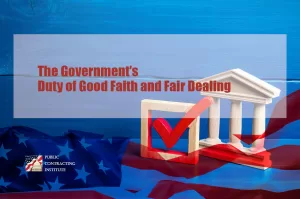The long-standing principle that the federal government had the same implied duty of good faith and fair dealing as any commercial buyer was put in jeopardy by a 2010 decision of the U.S. Court of Appeals for the Federal Circuit, Precision Pine & Timber, Inc. v. U.S., 596 F.3d 817 (Fed. Cir. 2010). There a panel of the court adopted a narrow rule seemingly limiting application of the principle to situations where a government action was “specifically targeted” at the contractor or had the effect of taking away one of the benefits that had been promised to the contractor. Although the decision concerned a timber sales contract not a procurement contract, when I wrote it up in the May 2010 Nash & Cibinic Report (24 N&CR ¶ 22), I expressed the fear that the reasoning would be subsequently applied to procurement contracts.
My fear was realized in a construction contract case, Metcalf Construction Co. v. U. S., 102 Fed. Cl. 334 (2011). In that decision, the judge described egregious conduct on the part of the government officials that would have been held to be a breach of the implied duty of good faith and fair dealing under many earlier cases. However, the judge held that under the Precision Pine standard, the contractor had not proved that the actions were specifically targeted at the contractor. In the February 2012 Nash & Cibinic Report (26 N&CR ¶ 9), I criticized this decision but stated that I believed that even if the decision was affirmed on appeal, most contracting officers would not take this as a signal that the proper way to administer contracts was to abuse the contractor.
Fortunately, a panel of the Federal Circuit has reversed the decision, Metcalf Construction Co. v. U. S., 2014 WL 519596, 2014 U.S. App. LEXIS 2515 (Fed. Cir. Feb. 11, 2014). The court held that the lower court had read Precision Pine too narrowly and that “specific targeting” was only one example of the type of conduct that could constitute a breach of the implied duty of good faith and fair dealing. Importantly, the court also rejected the government’s argument that this “implied duty” only could be found when it was footed in some express provision of the contract. The court concluded that the correct rule was only that the express provisions of a contract had to be examined to ensure that they had not dealt with the conduct of the government; for if they had, they would override the implied duty.
This leaves us in a tenuous position with regard to the views of the Federal Circuit. We have one panel in Precision Pine stating a narrow rule, another panel in Metcalf Construction stating the traditional rule, and a third panel in Bell/Heery A Joint Venture v. U.S., 739 F.3d 1324 (Fed. Cir. 2014), ruling in favor of the government because the contractor had not alleged facts showing that the government had “engaged in conduct that reappropriated benefits promised under the contract” (which is part of the Precision Pine reasoning). Thus, it is difficult to state where the judges of the Federal Circuit stand. Hopefully, the court will agree to take either Metcalf Construction or Bell/Heery to the full court for an en banc review of the issue.
I’ve never been sure why the Department of Justice has so vigorously argued that the government should not be held to the same standards of conduct as a commercial buyer. Of course, persuading the courts and boards that a narrower standard should be applied to the government is a way to win litigated cases. But, in my view, encouraging abusive or non-cooperative conduct hurts the government as much as it hurts its contractors. I have taught for many years that in the long run the government benefits from actions that show industry that it is a fair contracting partner. A line of published judicial decisions that demonstrates that the government is not such a partner is one more of the many messages that tell companies they should sell to the government only when they can find no other customer. Surely, this is not the message that government agencies in need of products and services on the commercial marketplace want to convey to companies that can provide those products and services.
Many years ago when I came to Washington to work in the field of government contracting, I concluded that there was one major advantage to being on the government side of the negotiating table. That advantage was that I was under no pressure to extract money from the contractor by unfair bargaining or unfair contract administration. To me fairness was an integral part of the job of a government employee. I still believe it and teach it. Thus, no matter what the outcome of the good faith and fair dealing litigation, I will continue to urge government employees that fair treatment of contractors is the only way to go.

